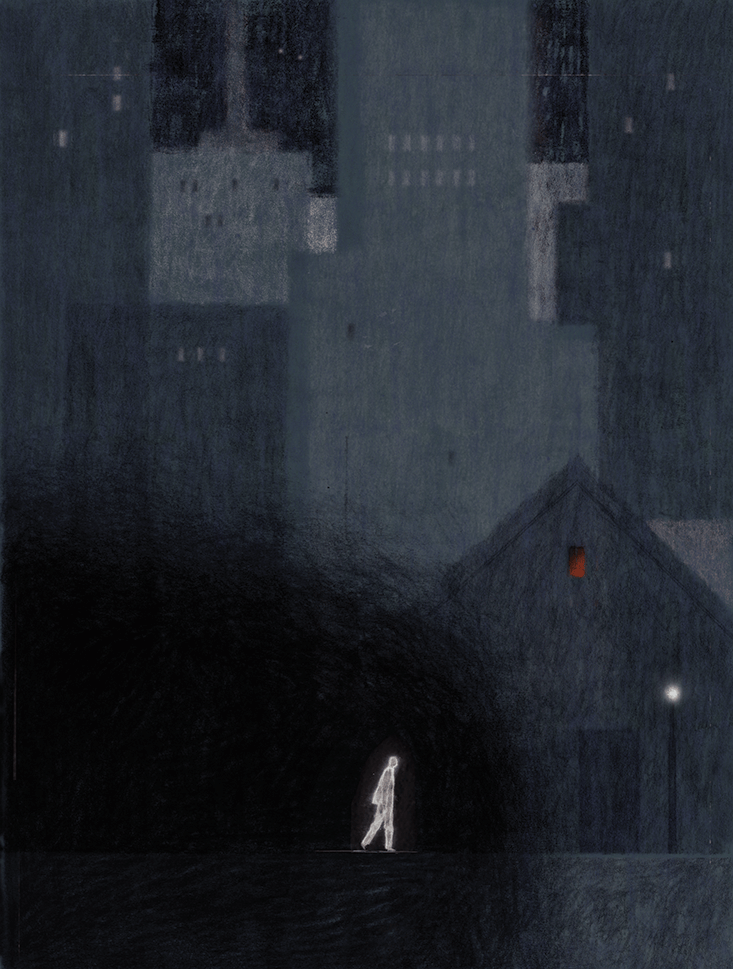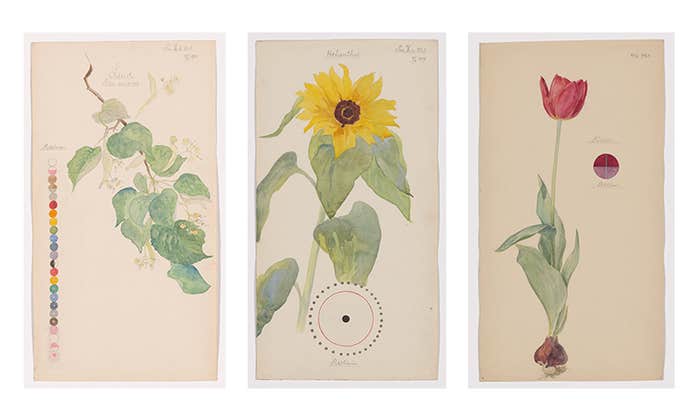The fog was thick when I left my bedsit and ventured out alone into the barren and murky city. I was heading for what used to be called a crematorium and these days is known as a funeral parlor. I had received a notice instructing me to arrive by 9 a.m., because my cremation was scheduled for 9:30.
The night before had resounded with the sounds of collapsing masonry—one huge crash after another, as though a whole line of buildings was too tired to stay standing and had to lie down. In this continual bedlam I drifted fitfully between sleep and wakefulness. At daybreak, when I opened the door, the din suddenly halted, as though just by opening the door I had turned off the switch that controlled the noise. On the door a slip had been posted next to the notices that had been taped there ten days earlier, asking me to pay the electricity and water bills. In characters damp and blurry in the fog, the new notice instructed me to proceed to the funeral parlor for cremation.
Fog had locked the city into a single, unchanging guise, erasing the boundaries between day and night, morning and evening. As I walked toward the bus stop, several human figures appeared out of nowhere, only to disappear just as quickly. I cautiously walked ahead for a distance, only to find my passage blocked by some kind of signage that appeared to have suddenly grown out of the ground. I thought there ought to be some numbers on it—if the numbers were 203, then this was the stop for the bus I wanted to take. But I couldn’t make out the numbers, even when I felt for them with my hand. When I rubbed my eyes I seemed to see the number 203, confirming that this was indeed my stop. But now I had a strange feeling that while my right eye was in the original place, my left eye had moved outward to my cheekbone. Then I became aware that next to my nose a foreign object had attached itself to my face, and something else was caught underneath my chin. When I felt around with my hand, I discovered that my nose was next to my nose and my chin next to my chin—somehow they had altered their locations.
This was an important day, I realized—my first day
of death.
Amid the murky figures and ghostly buildings I heard sounds of life rising and falling like ripples of water. Then, as I stood waiting for my bus in the inchoate gloom, I heard cars crashing into each other, but the heavy fog drenched my eyes and I couldn’t see the collisions—all I was aware of was a series of violent impacts. A car burst out of the fog behind me, sped past and into the tumult of noise, and the uproar exploded like boiling water.
I stood and waited a bit longer, but soon realized that if there was a pile-up on this stretch of road, the No. 203 bus would not arrive any time soon and I should go on to the next stop.
As I walked on ahead, snowflakes came billowing out of the fog. They seemed to glow like patches of light, and when they landed on my face my skin felt slightly warmer. I came to a halt and studied how the snowflakes were landing on me. My clothes gradually stood out more clearly against the snow.
This was an important day, I realized—my first day of death. I hadn’t washed and I hadn’t dressed in funerary costume—I was simply wearing my ordinary clothes, with a baggy old overcoat on top, as I headed toward the funeral parlor. Stricken with sudden misgivings at my sloppy attire, I turned on my heels and headed back in the direction from which I’d come.
The falling snow had brought some light to the city and the thick fog seemed to slowly dissipate as I walked, so that I could faintly make out pedestrians and vehicles going to and fro. As I reached the bus stop I had just left, a scene of utter confusion met my eyes: The road was completely blocked by a chaotic tangle of over twenty vehicles, with police cars and ambulances ringing the perimeter. There were people lying on the ground and others being pulled out of cars that were twisted completely out of shape; there were people moaning and people crying and people who made no sound at all. I stopped for a minute and this time I could see clearly the number 203 on the sign. I made my way past.
When I got back to my bedsit, I undressed, walked naked over to the shower enclosure, and turned on the faucet. As I filled my palms with water and began to wash, I found my body was covered in wounds, and gingerly removed the bits of gravel and splinters of wood that were embedded in the open lesions.
Just then my mobile phone started to ring. I found this strange, because service had been disconnected two months earlier for non-payment, and here suddenly it was ringing again. I picked it up and pressed the listen button. “Hello?” I said quietly.
A voice responded. “Is that Yang Fei?”
“That’s right.”
“Funeral parlor here. Where are you now?”
“I’m at home.”
“What are you doing?”
“I’m washing.”
“It’s almost nine o’clock now! How can you still be washing?”
“I’ll be there soon,” I said guiltily.
“Hurry up then, and be sure to bring your reservation slip.”
“Where will I find that?”
“It’ll be on your door.”
Then he hung up. I wasn’t very happy about this—why was there such a rush? I put down the phone and renewed my efforts to clean my wounds. I picked up a bowl, filled it with water and used it to wash out the remaining grit and splinters. This helped to speed things up.
Still dripping wet, I walked over to the wardrobe and opened it, in search of a funerary costume. But I could find nothing answering this description—the closest thing was a pair of white silk pajamas with a low-key flower pattern and the faded characters Li Qing embroidered in red thread on the chest, a souvenir of my brief marriage. One day Li Qing had carefully chosen two traditional Chinese-style pajamas for us, sewing my name on hers and her name on mine. After our marriage broke up I had never worn these pajamas since our breakup, but now, when I put them on once more, their color seemed as warm as snow.
I opened the door and carefully studied the funeral parlor notice on the door. On it was written A3—a reservation number, by the look of it—so I detached it, folded it carefully, and put it in my pajama pocket.
As I was about to leave I had the feeling I’d forgotten something and stood for a moment in the swirling snow to ponder. Then I remembered—a black armband. I was a single man, parentless and childless, with nobody to come and mourn my passing, so it was up to me to wear one.
I went back into my room and rifled through the wardrobe for some black cloth. After a prolonged search all I could find was a black shirt so worn that it was now turning gray. I cut off part of the sleeve and placed it over my left arm. My mourning attire clearly left something to be desired, but I felt tolerably satisfied with the effect.
Once more my phone rang. “Is that Yang Fei?”
“Yes, hello.”
“Funeral parlor here. Are you still planning to get cremated?”
I hesitated for a moment. “Yes, I am.”
“It’s nine-thirty now—you’re late.”
“Is it so important to be on time?” I wanted to do things right.
“If you want to get cremated, you need to hurry it up.”

Entering the funeral parlor I found the waiting room spacious and deep. The fog outside had gradually dissipated but the waiting room itself was still wreathed in mist, and some widely spaced wall sconces in the shape of candles gave off a pale glow, also the shade of snow. Somehow I felt warmed by the color white.
The right side of the waiting room was taken up by rows of plastic chairs bolted to the floor, while on the left side was an armchair zone with easy chairs arranged in several rings with plastic flowers laid out on the coffee tables in the center of each circle. On the plastic chairs many people were waiting, but there were only five seated on the armchairs. They sat comfortably with a foot resting on their knee, looking very pleased with their accomplishments, while everyone in the plastic seats sat stiffly and properly.
As I entered, a man wearing a faded blue jacket and a pair of old gloves walked toward me. He was so thin that his bones were like sticks and his face seemed little more than a skull, for it had hardly any skin and flesh.
Seeing my face with its reshaped features, he greeted me softly, “Ah, there you are.”
“Is this the crematorium?” I asked.
“It’s not called the crematorium anymore,” he said. “It’s called the funeral parlor.”
I realized I’d said the wrong thing, a bit like entering a hotel and asking, “Is this the hostel?”
In his voice I detected a weary, jaded tone, and I could tell he was not the person who had called from the funeral parlor earlier. I apologized for my tardiness, but he shook his head gently and consoled me by informing me that late arrivals were not unusual. My reservation number had expired and was no longer valid, so he walked over to the number dispensing machine at the entrance to pick up a new ticket for me.
The crematees on the plastic chairs talked in low voices amongst themselves.
I had been pushed back from A3 to A64; according to the ticket I had fifty-four people ahead of me.
“Will you be able to fit me in today?” I asked.
“There are always some no-shows,” the usher replied.
With a gloved finger he pointed at the plastic chairs to indicate that was where I should wait. Noticing that my eyes were drawn to the armchairs, he explained that they belonged to the VIP zone, and my status qualified me only to a place in the basic seating. As I made my way over to the plastic chairs, ticket in hand, I heard him muttering to himself, “Another poor guy who’s come here without a facelift.”
I sat down in a plastic chair. The usher paced back and forth in the pathway that separated the two waiting areas, seemingly lost in thought, his shoes tapping on the floor with the same steady rhythm as that of someone knocking on a door. Late arrivals kept showing up, and he would greet them with an “Ah, there you are” and pick up a new reservation ticket for them and point a finger in the direction of the plastic chairs. One of the late arrivals was an elite guest, and he walked him over to the armchair zone.
The crematees on the plastic chairs talked in low voices amongst themselves, while the six in the VIP area also chatted, but loudly, like singers projecting lyrics on stage. Our conversations, by comparison, were like the accompaniment emanating from the orchestra pit.
Funerary clothes and cinerary urns were the central topics of discussion among the VIPs. They were wearing exquisite hand-made silk cerements with bright hand-embroidered designs, and they were discussing casually the price of these garments—all of which cost over twenty thousand yuan. The costumes looked splendid to me, like outfits worn in an imperial palace. Then they switched attention to their respective cinerary urns, which were made of large-leaf red sandalwood engraved with exquisite designs and priced in the sixty thousand yuan range. The urns’ names were equally splendid and imposing: Sandalwood Precincts, Immortal Crane Palace, Dragon Palace, Phoenix Castle, Unicorn Palace, and Sandalwood Mansion.
We commoners were discussing the same topics. In our case the funerary garments were of synthetic silk with cotton trim, costing about one thousand yuan. The cinerary urns were either cypress or wood composite, undecorated, the most expensive costing eight hundred yuan, the cheapest two hundred. The names for these urns took simpler forms, such as Falling Leaves Return to their Roots, or Fragrance Lingering for Time Everlasting.
Whereas the VIP section was focused on the relative expense of their garments and urns, the plastic chairs were focused more on comparing who got the best value for money. Two sitting in front of me found that they had bought identical sets of burial clothes at the same shop, but one paid fifty yuan less than the other. The one who’d been charged more heaved a sigh. “My wife is hopeless at bargaining,” he muttered to himself.
Their faces were heavily made up, as though they were about to perform on stage, rather than be cremated.
I noticed that the other crematees in the plastic seats were all wearing funeral garments, either traditional cerements in Ming-Qing style or contemporary designs in Mao-jacket idiom or Western style. I was the only one dressed in a pair of Chinese clasp-tied pajamas, but I was glad that I had at least jettisoned the baggy cotton overcoat—although my white pajamas were shabby they could scrape by here among the plastic seats.
But I had no urn, not even a cheap one like Falling Leaves or Fragrance Lingering. This issue began to vex me—just where would my ashes end up? Should they be scattered in the boundless ocean, perhaps? But that was out of the question. That’s the resting place for the ashes of the great, with an airplane to carry them and a navy warship to guard the route, the ashes consigned to the sea amid the tears and sobs of relatives and underlings. My ashes would be tipped out of the oven and greeted by a broom and dustpan, then dumped in a garbage can.
An elderly gentleman in one of the adjacent chairs turned his head and looked at me in surprise. “You haven’t washed or reshaped?”
“I washed,” I said. “I did it myself.”
“But what about your face?” he said. “The left eye has come out and your nose has got out of position and your chin is so long.”
I realized now, to my embarrassment, that I had forgotten about my face when washing. “I didn’t reshape.” I said.
“Your family really has been remiss,” the old man said. “They neglected both the wash and the reshape.”
In fact, of course, I was all alone. My adoptive father, Yang Jinbiao, who had raised me from infancy, had left me a year earlier when he realized he was terminally ill, and my birth parents were far away in a northern city, not realizing that at this moment I was already in another world.
A woman on the other side, who had been following our conversation all this time, now studied my outfit. “How come your cerements looks like pajamas?” she asked.
“What I’m wearing is funerary garments,” I explained.
“Funerary garments?” She didn’t seem to understand.
“Funerary garments are the same things as cerements,” the gentleman said.
“ ‘Cerement’ sounds better.”
I noticed that their faces were heavily made up, as though they were about to perform on stage, rather than be cremated.
Someone else in the plastic seats began to complain to the usher: “I’ve been waiting for ages now, but I’ve yet to hear my number called.”
“They’re just in the middle of the farewell ceremony for the mayor,” the usher replied. “They stopped after the first three crematees this morning and we need to wait for the mayor to enter the oven. It won’t be your turn until he comes out.”
“Why do you have to wait for him to be cremated before you do us?” the man continued to wrangle.
“I don’t know the answer to that.”
“How many ovens have you got?” another person waiting asked.
“Two—one import and one domestic brand. The import is reserved for VIPs—you’ll be using the domestic make.”
“Is the mayor a VIP?”
“Yes.”
“Does he need both ovens?”
“He’ll be using the imported one.”
“Well, why are you holding back on the domestic one, then?”
“I’m not clear about that—all I know is that both ovens are currently out of service.”
A VIP in the armchair zone waved a hand to beckon the usher, and he walked briskly over to attend to his inquiry.
“How long is it till the farewell to the mayor?” the VIP asked.
“I’m not quite sure.” The usher paused. “It’ll be a little while yet, I imagine. Please just wait patiently.”
A crematee who had just arrived provided an update as he made his way to his seat. “If you add up all the city officials, big and small, as well as those from adjacent districts and counties, that must amount to over a thousand people, and every one of them needs to say goodbye to him, and they can’t walk fast—they need to walk past slowly, and some will want to weep as well.”
“What’s so special about a mayor?” the VIP grumbled.
The new arrival had not finished. “Starting this morning, all the main roads in the city were sealed off and the vehicle carrying the mayor’s remains moved along at walking pace, with several hundred cars escorting him behind. What should have taken just thirty minutes required a good hour and a half. The main roads are still sealed off and regular traffic won’t resume until after the mayor’s ashes have been returned home.”
If the main roads are sealed off, the other streets are bound to be crammed with traffic. I remembered the sound of collisions when I was walking in the fog that morning and the scene of havoc that I saw later. Then I was reminded of the news of the mayor’s sudden death that had circulated on all the newspapers and television channels a couple of weeks earlier. The official explanation was that he had suffered a heart attack as a result of overwork; the popular version making the rounds on the Internet was that the mayor had suffered a heart attack in the executive suite of a five-star hotel just as he reached orgasm with a young model. The model was so shocked that she ran into the corridor screaming and sobbing, forgetting she was naked below the waist.
Then both sets of conversations turned to the topic of burial plots. Those in the plastic chairs had plots measuring one square yard, whereas the burial grounds for the VIPs were all at least six acres. Perhaps because the VIPs had heard what the plastic-seaters were saying, one of them asked loudly, “How can one possibly make do with one square yard?”
“Dying is such an expensive business these days!” one of the crematees in the front row grumbled.
A hush fell over the plastic seats as people began to listen to the luxurious appointments of those in the armchairs. Five out of the six burial plots were established on mountain peaks, facing the sea, encircled by clouds, the most uplifting and awe-inspiring ocean-view gravesites imaginable. The sixth was in a dale where trees grew thickly, streams gurgled and birds sang, with a natural rock as headstone that had put down roots there for hundreds of thousands of years. These days everyone wants to eat organic foodstuffs, he said, but his was an organic headstone. Of the other five grave enclosures, two were miniature versions of real buildings—one a Chinese-style courtyard dwelling, the other a Western-style villa—while the other two boasted formal grave steles—they didn’t go in for all that showy stuff, their owners said. The last one took everybody by surprise, for his stele was a full-scale replica of the Monument to the People’s Heroes in the Tiananmen Square, the only difference being that the inscription in Mao Zedong’s calligraphy “In eternal tribute to the people’s heroes” had been changed to “In eternal tribute to Comrade Li Feng”—also in Mao’s calligraphy, since his family had hunted down the characters for Comrade Li Feng in Mao’s manuscripts, enlarged them, and inscribed them on the stele.
“Comrade Li Feng—that’s me,” he added.
“It all sounds a bit risky,” another VIP said. “One of these days the government might insist on demolishing a memorial like that.”
“I’ve already paid my hush-money,” he responded confidently. “I can’t afford to let the story get out, so my family has already deployed a dozen people to keep reporters from covering the story. Twelve is exactly the strength of an army squad, and with a team of guards protecting me I can rest without any worries.”
At this point the two rows of ceiling lights in the waiting room came on, and the twilight hour suddenly was transformed into noonday. The usher quickly marched toward the front door.
The mayor entered, dressed in a black suit, white shirt and black tie. He walked in soberly, sporting heavy makeup on his face, a pair of black, bushy eyebrows, and bright lipstick on his lips. The usher greeted him, leading him in solicitously. “Mayor, please make yourself comfortable in the VIP luxury suite.”
The mayor, nodding, followed him in. Two huge doors in the waiting room slowly swung open, only to close again slowly once he had entered.
The VIPs in the easy chairs had all gone quiet. The VIP luxury suite had reduced the armchair zone to silence; wealth conceded its inferiority to power.
Among the plastic chairs, conversation continued to rise and fall, with burial remaining the topic of interest. Everyone bemoaned the fact that graves were now even more expensive than houses. In graveyards that were terribly crowded, despite their remote location, a square-yard plot still cost you thirty thousand yuan—and with a guaranteed tenure of only twenty-five years. Although houses were expensive, at least you could be sure of keeping them for seventy years. Some crematees were highly indignant, while others were racked with anxiety. “What will happen after twenty-five years?” they worried. By that time the price of a grave plot would most likely have reached astronomical levels, and if their family couldn’t afford to pay out for a renewal of the lease, their ashes would simply end up as agricultural fertilizer.
“Dying is such an expensive business these days!” one of the crematees in the front row grumbled.
“Best not to think about the future,” the old gentleman next to me calmly advised.
The old man told me that seven years earlier he had purchased a square-yard plot for three thousand yuan, and now it was worth thirty thousand. He rejoiced in his foresight at the time—if he wanted to buy it now, he would never be able to afford it.
“In seven years the price has risen tenfold,” he marveled.
Reservation numbers began to be called. The mayor had clearly now been cremated, and his urn, over which the Communist Party flag had been laid, was deposited on a black hearse, which then slowly moved away, followed by several hundred sedans, and funereal music began to sound from the sealed-off roads. I realized now that whereas ordinary reservation numbers began with an A, VIP reservation numbers began with a V. I wasn’t sure what letter reservation numbers of luxury VIPs like the mayor started with—perhaps they didn’t require any number whatsoever.
The six VIPs with the V numbers went in. Many A numbers were called, but just as the usher in blue had said, there were a lot of no-shows—occasionally there would be ten or more no-shows one after another. I noticed now that the usher was standing in the passageway next to me, and when I raised my head to look at him his weary voice again sounded. “The no-shows don’t have graves.”
I had neither urn nor grave. “Why did I come here?” I wondered.
I heard the number A64 called—my number—but I stayed put in my chair. A64 was called three times and then they moved on to A65. The woman next to me stood up. She was wearing a traditional shroud—in the Qing dynasty style, it looked like—and as she walked her wide sleeves swung back and forth.
The old man next to me was still waiting, and still chatting. He said that although his grave-site was out of the way and hard to get to, the scenery was decent, with a small lake nearby and some just-planted saplings. He said that once he was there he planned to stay put, so it didn’t matter to him that it was far away and not convenient to reach. Then he inquired in which funeral garden he would find my grave.
I shook my head. “I have no grave.”
“Without a grave, where will you go?” he asked in astonishment.
I felt my body stand up. It took me and left the waiting room.
Yu Hua is a Chinese fiction writer. He has written four novels, and several collections of short stories, and essays. In 2002, he became the first Chinese writer to win the James Joyce Award.
From the book: The Seventh Day by Yu Hua, translated by Allan H. Barr
Copyright © 2015 by Yu Hua
English translation copyright © 2014 by Allan H. Barr
Published by arrangement with Pantheon Books, an imprint of The Knopf Doubleday Publishing Group, a division of Random House LLC


























